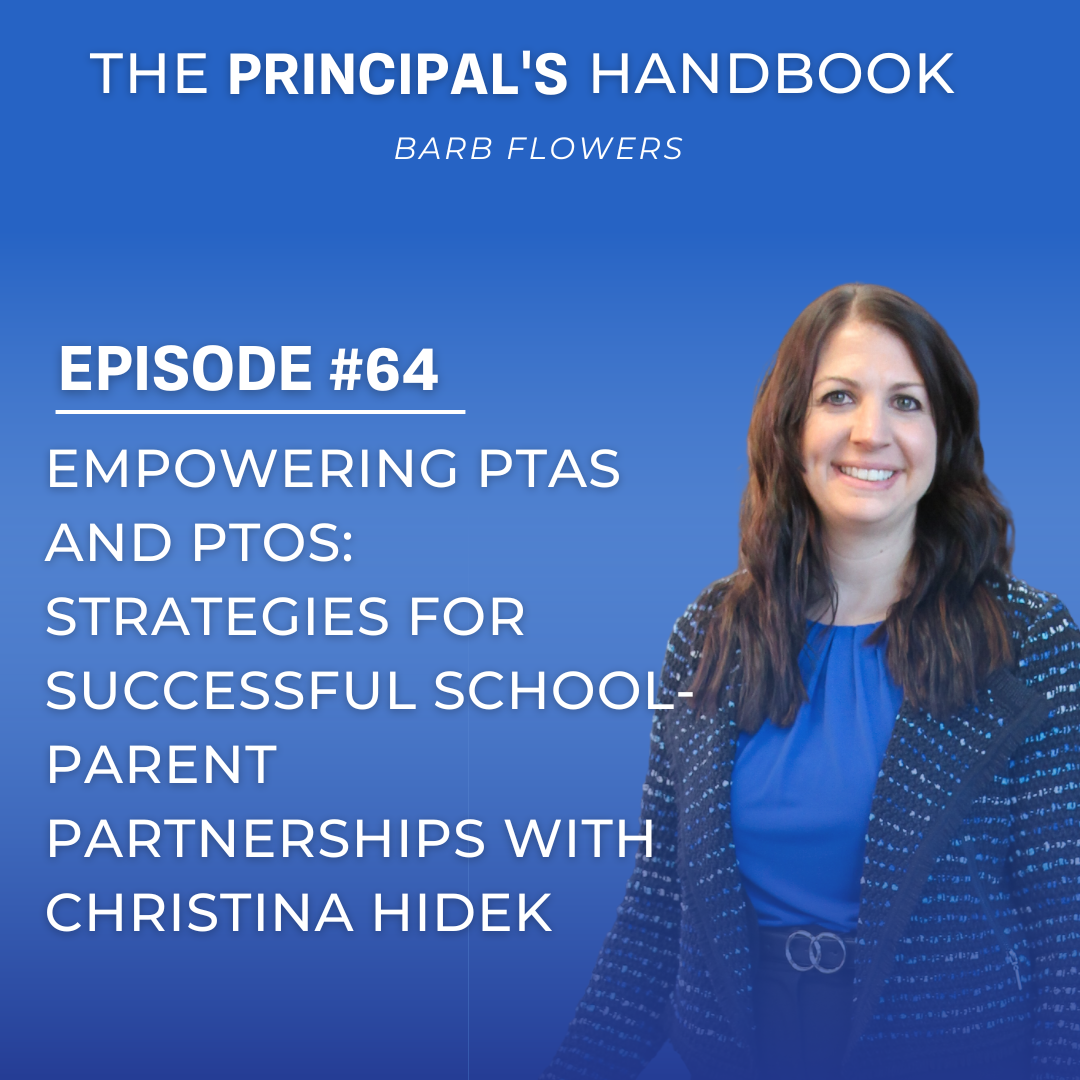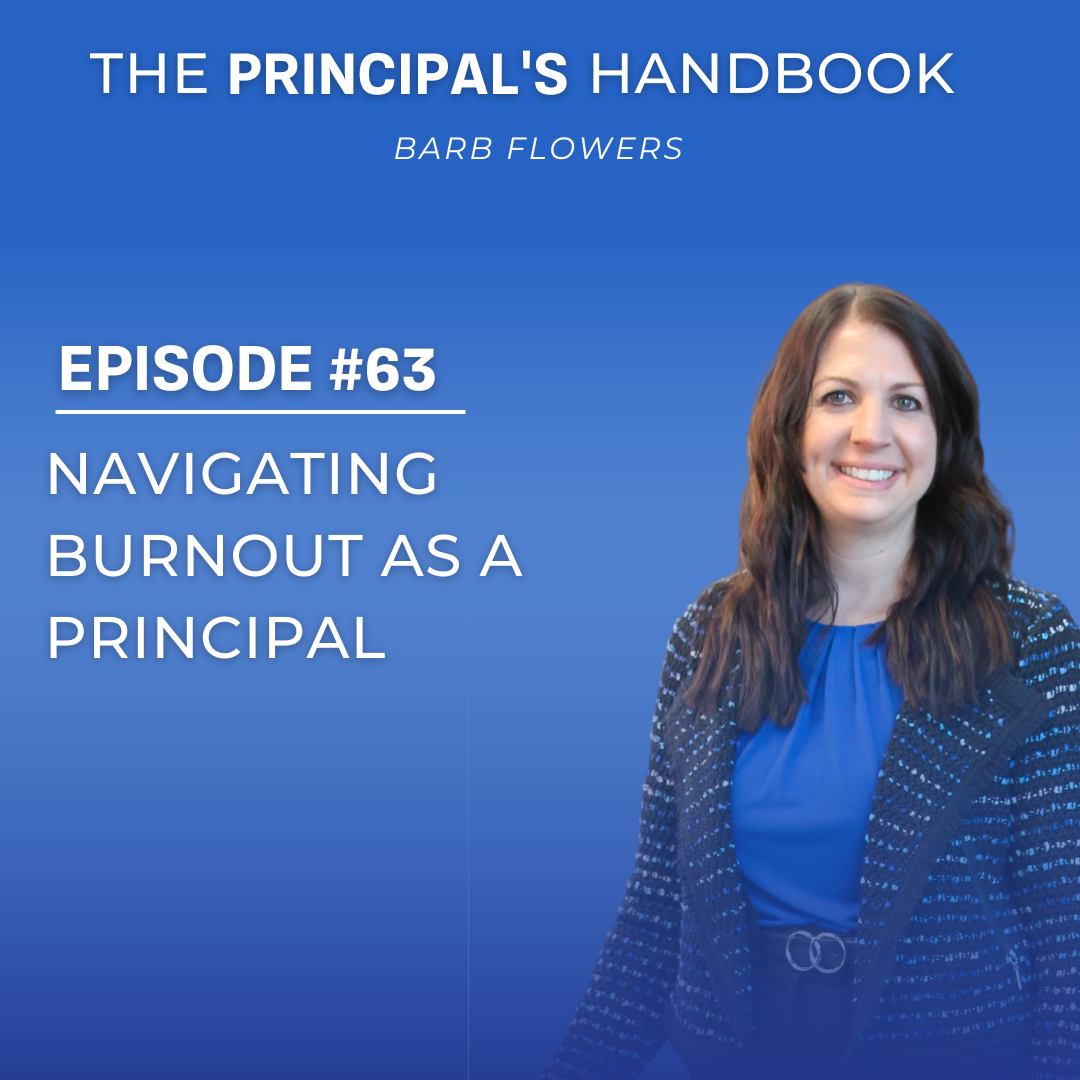[00:00:00] In today’s episode, I want to talk about being your own worst critic as a principal. Stay tuned.
Welcome to The Principal’s Handbook, your go-to resource for principals looking to revamp their leadership approach and prioritize self-care. I’m Barb Flowers, a certified life coach with eight years of experience as an elementary principal. Tune in each week as we delve into strategies for boosting mental resilience, managing time effectively, and nurturing overall wellness.
From tackling daily challenges to maintaining a healthy work-life balance, I’m Barb Flowers. We’ll navigate the complexities of school leadership together. Join me in fostering your sense of purpose as a principal and reigniting your passion for the job. Welcome to a podcast where your well-being is the top priority.
Welcome everyone to today’s podcast. We’re diving into a topic that affects us all: being your own worst critic as a school principal. This can be a real challenge, and today we’ll explore how self-criticism manifests in our role as a principal, how it impacts our leadership, and most importantly, how we can overcome it.
I want you to think about this scenario: You’re sitting in your office late on a Friday afternoon, the week is wrapping up, and you’re reviewing everything that happened. Sometimes it feels like a whirlwind, right? You can’t believe everything that’s happened. As you reflect, a nagging voice starts to point out all the things you could have done better.
You think about the student discipline, the parent who called and was angry, how you handled that discipline. You think about the teacher who didn’t like how you handled the discipline or the teacher upset about their evaluation. Or maybe it’s the teacher who got into a conflict with another teacher that you had to mediate. Or maybe it’s just dealing with constant discipline.
I remember so many weeks where it felt like constant discipline. Does this sound familiar? That inner critic evaluating everything you’re doing, criticizing it all. Before we dive deeper, let’s talk about what it means to critique.
Critique is that voice inside our head that judges our actions, decisions, and even our worth as school leaders. While it’s good to reflect and think about how we can do things differently, there’s a fine line between self-reflection and being our own worst critic. When we cross that line, we start beating ourselves up over every little thing that happened.
That negative judgment stays in our brain, and it undermines our leadership effectiveness. We begin to think about it constantly, and if we’re not careful, it can have huge impacts on our well-being. So, let’s break down how judgment shows up in three ways: we judge ourselves, we judge others, and we judge circumstances.
1. Judging Ourselves
Imagine you just finished a really difficult meeting with a parent whose child was involved in a serious discipline issue—maybe they got into a fight and you had to give consequences. Afterward, you sit in your office and your mind races with thoughts like, I should have been more assertive in explaining the policies, Why didn’t I anticipate that this parent would be upset and come in screaming at me?, Why didn’t I have better responses? and Maybe I’m not cut out for these difficult conversations or high-pressure situations.
You might even think, Maybe I’m not cut out to be a principal. I’m not good at discipline. That part of the job I hate, and I’m just not good at it. These are classic examples of self-judgment—negative, non-constructive thoughts that focus on what went wrong, undermining your confidence and self-efficacy as a leader.
2. Judging Others
Now, imagine you’re observing a veteran teacher’s classroom. You’ve given lots of feedback in the past, but they’re still struggling with implementing new instructional strategies—let’s say, strategies related to the Science of Reading. You think, We’ve had so much professional development on this, why can’t they just follow the new curriculum? How have they managed to teach for 20 years without mastering a basic engagement skill?
This is all judgment. You’re thinking, They never change. They don’t want to change. This kind of thinking isn’t reflective or helpful in any way. It’s not going to help the teacher improve. In fact, it creates negative energy, potentially damaging your relationship with them. When you come from such a negative place, it’s hard to give feedback they’ll receive positively and be able to act on.
3. Judging Circumstances
Let’s say you decided to launch a school-wide initiative to improve parent engagement. You plan a family night, get a team of teachers to help, and work hard to make it a success. The night arrives, and only two parents show up. The effort you put in feels wasted. You might think, This always happens. Our community never supports us. Parents never show up. Why did I even bother?
Instead of looking at the event neutrally, you turn it into a negative judgment. The next time someone suggests a parent event, you might dismiss the idea with, We’ve tried that before. It never works. Parents don’t want to come to these things.
Every time we engage in these types of judgments—whether we’re judging ourselves, others, or circumstances—we’re rewiring our brains to default to the negative. It may seem like you’re helping yourself by pointing out the flaws, but in reality, it just strengthens the negative pathways in your brain. For principals, this can have serious consequences.
It will decrease your confidence in decision-making. It will strain your relationships with staff, students, and parents, even if you don’t verbalize all your judgments—people can sense it. It will make it harder to take risks and try new things. And ultimately, it increases stress and the potential for burnout because everything you’re doing is coming from a negative lens.
I want you to think about this: every thought you have strengthens or creates new neural pathways. You get to decide whether you’re reinforcing those negative pathways, making it easier for you to have negative thoughts, or if you want to change that.
So right now, let’s take a moment. Start to recognize your inner critic. Where do you notice yourself being negative in your leadership? Is it judging yourself, others, or circumstances? Stop and think about that.
Some signs that you’re judging a lot include using phrases like, I should have, I needed to, I wish I would have when reflecting on your decisions. If you constantly ruminate on past interactions or feel frustrated or disappointed with your progress or others’ progress, or hesitate to make decisions or delegate tasks because you doubt yourself, those are all signs that your inner critic is strong.
Once you’re aware of this, it’s time to stop those negative thoughts. Recognize them, and stop them in their tracks. That’s the first step to overcoming them.
Overcoming Self-Judgment
Now, let’s talk about a few strategies for overcoming self-judgment:
-
Practice Empathy: Empathy is the opposite of judgment. When you practice empathy, you understand where you’re coming from and why you made the decisions you did. For example, reflecting on a difficult meeting, you might think, I did the best I could in that situation, and next time I’ll prepare a bit more in advance to better handle it.
If you’re thinking about a teacher who’s struggling, instead of thinking, They never change, try to consider their strengths and weaknesses and think, How can I support them to improve?
-
Reframe Your Thoughts: Instead of thinking, I should have been tougher with that discipline situation, try thinking, Next time I can prepare some bullet points ahead of time to ensure I communicate my point clearly. It’s a small shift, but it reframes your thinking from judgment to constructive reflection.
-
Mindfulness: Pay attention to your thoughts without engaging with them. When a negative thought arises, let it pass without focusing on it. If you catch yourself judging during a walkthrough, just notice it and let it go. Stay present in the moment by grounding yourself in what’s around you—what you see, hear, smell, and feel. This brings you back to the present and helps you avoid the trap of negative thinking.
I’ve created a free assessment to help you recognize and address your inner critic. If you’d like to dive deeper into overcoming judgment, take the assessment, and we can discuss the results together.
Remember, overcoming self-judgment is a journey, not a destination. It’s an ongoing process of awareness and improvement. By doing so, you’re not just improving your leadership, but you’re also modeling resilience and growth for your entire staff.
If you’re interested in the free assessment, reach out to me. I’d love the opportunity to help you improve as a principal. Thank you for listening, and if you love the show, please leave a review on Apple. Keep in mind that you have the power to shape your life according to the mindset you choose.
Have a great week, and I’ll see you next time!






